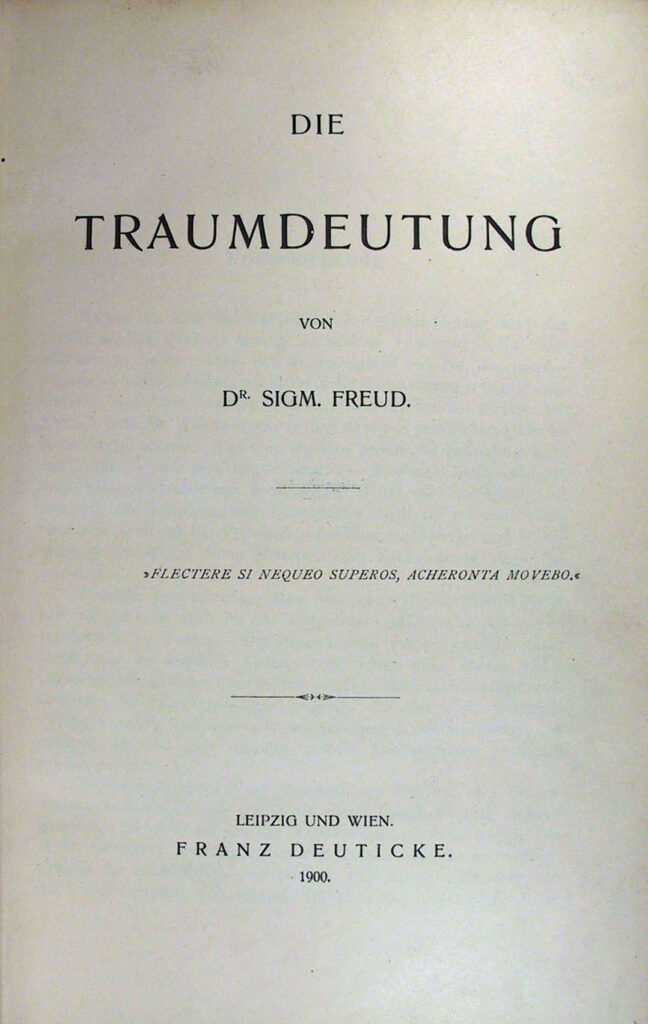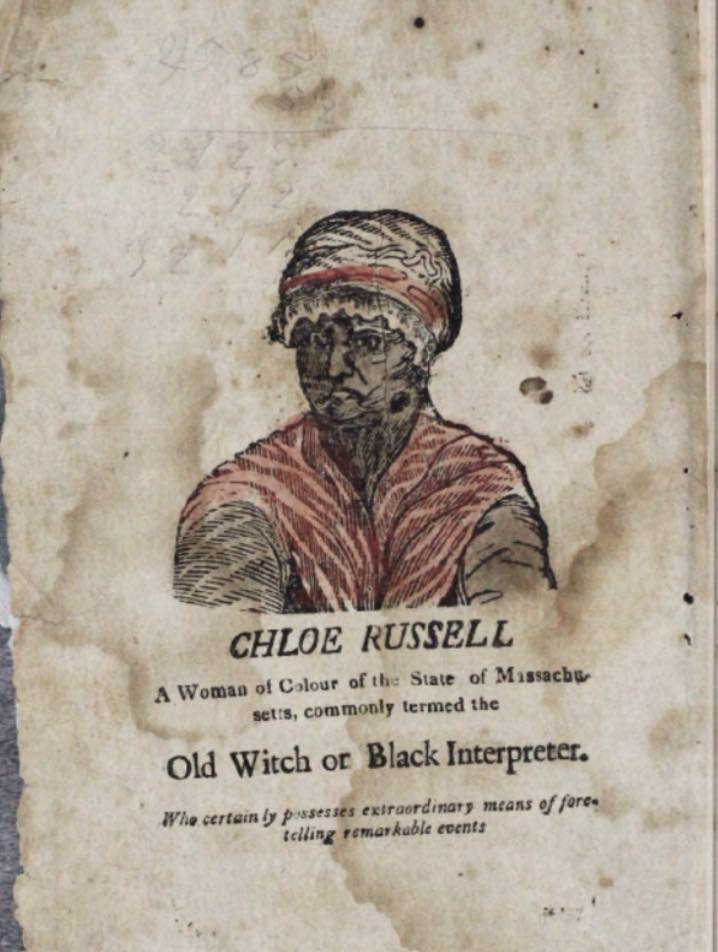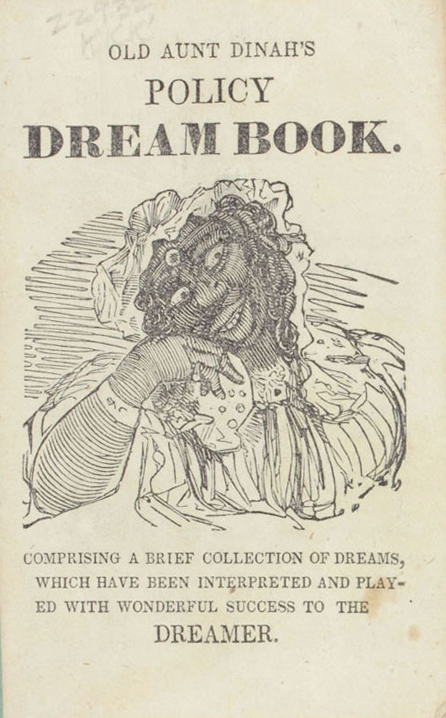Created by Sarah Gordon and Savita Maharaj
Introduction
For most twenty-first-century westerners the first name that comes to mind when considering dream interpretation is the Austrian founder of psychoanalytic theory Sigmund Freud. Published in 1913, The Interpretation of Dreams was very popular and hugely influential bringing dream interpretation from the realm of popular culture into the emerging “scientific” field of psychoanalysis. This exhibit looks at How does Chloe Russell’s The Complete Fortune Teller and Dream Book compare to Sigmund Freud’s The Interpretation of Dreams? Why did his text create such a shift in the way we think of dream interpretation?

Freud, Sigmund, and Brill, A. The Interpretation of Dreams, 1913, New York: MacMillan.
The Supernatural vs. the Scientific
Before the twentieth century, dreams were often seen as messages from God or other spiritual figures, assuming a supernatural ability in individuals lives. Chloe Russell based her dream content on her “power to interpret dreams of others”.1 Chloe Russell represents herself as aligned with the cultural archetype of the Black “cunning person” or spiritual expert, which may have been a marketing strategy for white audiences with preconceived notions of African Americans and their spirituality. Yvonne P. Chireau connects this phenomenon of commercialized African American spiritual practice to African divination traditions that involved the invoking of spiritual forces to gain information.2 Although dream interpretation work was not exclusive to Black Americans and divorced from religion, these influences were part of the persona African Americans like Russell took on to sell services or texts.

“Sigmund Freud,”1921, Britannica, Photograph.
In The Interpretation of Dreams, Sigmund Freud argued that he does not believe he has “gone beyond the bounds of neuro-pathological interests,” highlighting his belief that dreams are scientific theory rather than supernatural knowledge.3 He traces the study of dreams as an element of psychology to Aristotle: “The ancients prior to Aristotle regarded the dream not as a product of the dreaming psyche, but as an inspiration from the realm of the divine” and continues on to summarize The Scientific Literature on the Problems of Dreams.4 However, Freud also acknowledges his continued belief in the “pre-scientific conception” of dreaming.5 Freud admits his “opposition to the prevailing theory of dreams” because “dreams are capable of yielding an interpretation.”6 Unlike his contemporaries, Freud believed that interpreters like Chloe Russell thought the content of our dreams had relevant meaning to our waking lives. The Interpretation of Dreams “drew upon -- even as it profoundly recast -- elements of folk-wisdom” in the sense that it legitimized and rectified the same concepts of dream interpretation that existed in popular culture.7
The Future vs. the Past
Chloe Russell’s dream interpretation -- and the genre as a whole in the eighteenth and nineteenth centuries -- focused on dreams as a way to predict the future. According to Chloe Russell, if you dream about geese, it is “a sign that an absent friend will soon return.” This belief led people to pay for interpretation services and dream books in hopes of knowing their futures, especially regarding the events Chloe Russell focuses on in her text like love, marriage, family, loss, and prosperity.
Two examples of the differences between Chloe Russell's and Sigmund Freud's dream interpretation styles:
The Dream of Losing Teeth
Chloe Russell claims that "to dream your teeth drop out, is a token of losing some near relation."
Sigmund Freud famously believes that teeth in dreams signify sexual repression and to dream of teeth falling out represents masturbation.
The Dream of Being Naked
Chloe Russell claims that "to dream you are naked and ashamed of being so," means "you will meet with disappointments."
According to Sigmund Freud, a dream of being naked and ashamed comes from memories of early childhood when being naked is not shameful. The dream represents wish fulfillment of the desire to be naked without shame like in childhood (Freud 188).
Freud, meanwhile, “mov[ed] the focus of dreams from the future to the past,” as his theory of dream interpretation was based mainly on the premise that dreams represent wish fulfillment and memories from childhood.8 Freud asserts that “in every sense, dreams come from the past.” He admits to “some truth” in “the ancient belief that dreams show us the future,” but only in the sense that dreams represent our past wishes being fulfilled.9 This shift allowed Freud to reframe dream interpretation as a scientific pursuit, rather than a commercialized element of popular culture. However, with the rise of neurological and behavioral theories in addition to methods of psychology, most psychologists dismiss Freud’s theories as much as they would dismiss Chloe Russell’s. Neither are based on empirical evidence or can be proven true. What else, then, contributes to how we might read The Complete Fortune Teller and Dream Book differently than how we read The Interpretation of Dreams?
A Woman vs. a Man
Dream books in the eighteenth and nineteenth were associated with women and the archetype of the Black “cunning person” or “witch.”10 Freud was inspired by the popular women’s dream books, and once stated that “the view of dreams which came nearest to the truth was not the medical but the popular one, half involved though it still was in superstition.” Despite his dismissal of superstition, Freud admits that his theory is closer to these types of books than to other medical or scientific theories.

Russell, Chloe, The Complete Fortune Teller, and Dream Book, 1824, Boston Athenaeum. Book.
Freud gained more authority in his field because he was a man. In the eighteenth century to the early twentieth century, dreaming was “on the very borders of respectability” and even considered a sign of mental illness.11 Many scientists believed that only those who were disturbed had dreams at all. Dreams played an integral role in women’s lives, particularly in the eighteenth or nineteenth centuries.Women were frequently diagnosed with hysteria and neurosis as a way of explaining natural emotional reactions to traumatic and difficult aspects of female life such as pregnancy, social isolation, and abuse. Many critics drew on the concept of superstition as the result of a lack of education. These critics denied superstitious traditions, and educated men came to believe that women’s dream books targeted women’s inherent unintelligence and vulnerability.

Old Aunt Dinah’s Policy Dream Book Comprising a Brief Collection of Dreams, Which Have Been Interpreted and Played with Wonderful Success to the Dreamer, Library Company of Philadelphia.1850. Book.
Freud brought dream interpretation into intellectual men’s culture. Although his methods and theories are framed differently, they are surprisingly similar to those of women like Chloe Russell. Because of his hierarchical power authority and the misogyny engulfed in the world, Freud, claimed, “the representative dreamer [was] transformed from the woman for whom dream-book compilers wrote, to a universal man.”12
Conclusion
Despite similar influences, approaches to dreams, and a lack of empirical scientific basis, Sigmund Freud remains relevant to this day, while Black women like Chloe Russell are lost to history. Both offer an unproven, yet interesting, perspective on a mysterious aspect of human life. Chloe Russel and Sigmund Freud have value as historical documents, even if not they are not considered reputable in a psychology textbook.
Endnotes
1 Gardner, Eric. “‘The Complete Fortune Teller and Dream Book:’ An Antebellum Text ‘By Chloe Russel, a Woman of Colour.’”
(The New England Quarterly, Vol. 78, No. 2, 2005), 259-288
2 Chireau, Yvonne P.. Black Magic: Religion and the African American Conjuring Tradition, (University of California Press, 2003) https://ebookcentral.proquest.com/lib/northeastern-ebooks/detail.action?docID=223936.
3 Sigmund, Freud, and Brill, A. A. The Interpretation of Dreams. (New York: MacMillan, 1913), 5
4 Ibid 8
5 Ibid 80
6 Ibid 78
7 Dreams and History : The Interpretation of Dreams from Ancient Greece to Modern Psychoanalysis, edited by Daniel Pick, and
Lyndal Roper (Taylor & Francis Group, 2004) https://ebookcentral.proquest.com/lib/northeastern-ebooks/detail.action?docID=201039.
8 Dreams and History : The Interpretation of Dreams from Ancient Greece to Modern Psychoanalysis, edited by Daniel Pick, and
Lyndal Roper (Taylor & Francis Group, 2004), 125
9 Sigmund, Freud, and Brill, A. A. The Interpretation of Dreams. (New York: MacMillan, 1913), 412
10 Dreams and History : The Interpretation of Dreams from Ancient Greece to Modern Psychoanalysis, edited by Daniel Pick, and
Lyndal Roper (Taylor & Francis Group, 2004), 125
11 Dreams and History : The Interpretation of Dreams from Ancient Greece to Modern Psychoanalysis, edited by Daniel Pick, and
Lyndal Roper (Taylor & Francis Group, 2004), 129
12 Ibid 133
Bibliography
Chireau, Yvonne P.. Black Magic : Religion and the African American Conjuring Tradition, University of
California Press, 2003. ProQuest Ebook Central,
https://ebookcentral.proquest.com/lib/northeastern-ebooks/detail.action?docID=223936.
Dreams and History: The Interpretation of Dreams from Ancient Greece to Modern Psychoanalysis,
edited by Daniel Pick, and Lyndal Roper, Taylor & Francis Group, 2004. ProQuest Ebook
Central, https://ebookcentral.proquest.com/lib/northeastern-ebooks/detail.action?docID=201039.
Freud, Sigmund, and Brill, A. A. The Interpretation of Dreams. New York: MacMillan, 1913. Web.
Gardner, Eric. “‘The Complete Fortune Teller and Dream Book’: An Antebellum Text ‘By Chloe Russel,
a Woman of Colour.’” The New England Quarterly, vol. 78, no. 2, 2005, pp. 259–288. JSTOR,
www.jstor.org/stable/30045526.
Old Aunt Dinah’s Policy Dream Book Comprising a Brief Collection of Dreams, Which Have Been
Interpreted and Played with Wonderful Success to the Dreamer. Library Company of
Philadelphia.1850. Book.
Russell, Chloe, The Complete Fortune Teller, and Dream Book, 1824, Boston Athenaeum. 1824, Book
“Sigmund Freud,” Britannica, 1921. Photograph. https://www.britannica.com/biography/Sigmund-Freud
